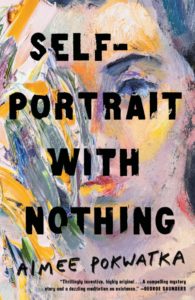
As a long-time lover of portals and multiverses, the description of Aimee Pokwatka’s debut novel Self-Portrait With Nothing immediately caught my eye. And when it was singled out for praise in Amal El-Mohtar’s Best of 2022 list, I determined to seek it out as soon as I could.
Self-Portrait with Nothing follows Pepper, a forensic anthropologist abandoned at birth by reclusive painter Ula Frost, whose portraits are said to open portals to other worlds. But when her biological mother disappears, Pepper suddenly finds herself searching for answers while pursued by mysterious organizations seeking to take Ula’s work for their own purposes.
Pepper doesn’t open the story completely in the dark. Inspired by the tales of her mother’s portraits, she spends plenty of time musing about what her life would’ve been like in another world where she’d make slightly different choices. But by and large, she lives a normal life, with a thriving career, a warm relationship with her veterinarian adoptive mothers, and a relatively happy marriage. She has little love for the mother who abandoned her, but harried by lawyers and reporters and secret societies, she finds herself pushed into a journey of discovery.
I’d been led to believe the main thrust of the novel would be that journey of discovery: exploring her feelings about Ula and the differences small decisions make on a life’s outcome. And those elements are certainly addressed, but I was surprised to find the book to follow more of the thriller template than anything else. Pepper would find a clue that would lead her to travel somewhere Ula may have been, where she would find another clue, travel to another place, find another clue, all while being pursued by shadowy actors with their own purposes. Her internal monologue spends a fair amount of time contemplating her life—with particular focus on a marriage becoming increasingly frosty as she moves from place to place without keeping her husband in the loop—but she spends much more time being dragged around by the plot.
Of course, some readers don’t mind a lead being dragged around by the plot, but I often find it a struggle, and for much of the book, there wasn’t much of an alternative hook to draw me in. Pepper’s musings about possibilities—while understandable—felt shallow, and her relationship struggles were almost entirely her fault. And until she reached the end of the string of clues, the exploration of parallel worlds was never more than theoretical. Together, it made for slow going for at least half the novel.
Fortunately, Self-Portrait with Nothing is short enough that a slow half doesn’t take long to push through, and the final third provides plenty of thrills while finally making use of the novel’s major premise. The exploration of other possibilities still feels a bit cursory, and the antagonists came off frustratingly shallow, but there was at least plenty of excitement in the payoff. And, to my pleasant surprise, Pepper exhibited enough personal growth to turn her long-running marital text thread from a point of frustration into a genuine emotional climax, hitting perhaps even harder than the main plot.
The sentence-level prose is good enough that the slow spots are never true slogs, and the final third certainly provides enough excitement to leave things on a high note. But the exploration of possibility never develops the kind of depth I’d hoped for, and the fraught mother/daughter relationship also stays fairly surface-level. All together, the result is a competent novel that fails to deliver on the promise of its premise, with shallow thematic work and an average thriller plot ultimately outshone by the lead’s marital subplot. It’s not a bad book, but it’s one that had me wondering just what other readers saw to praise it so highly.
Recommended if you like: thrillers with significant interpersonal subplots.
Can I use it for Bingo? It’s hard mode for Multiverses, and it features Mundane Jobs.
Overall rating: 13 of Tar Vol’s 20. Three stars on Goodreads.
